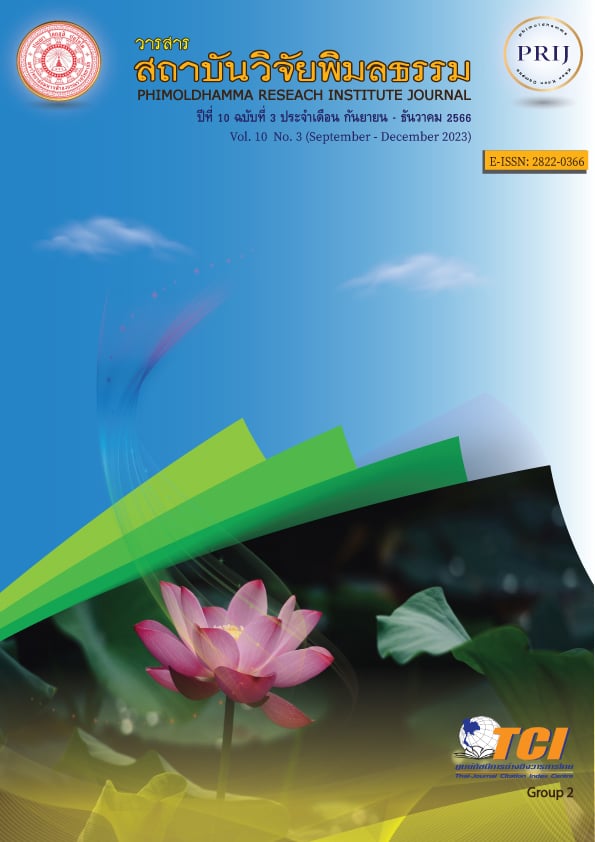วิเคราะห์การทำหน้าที่ของสามีภรรยาในสังคมไทยปัจจุบันตามหลักพุทธปรัชญาเถรวาท
คำสำคัญ:
การทำหน้าที่ของสามีภรรยา, สังคมไทยปัจจุบัน, หลักพุทธปรัชญาเถรวาทบทคัดย่อ
การวิจัยครั้งนี้ มีวัตถุประสงค์เพื่อ 1) ศึกษาสภาพปัญหาการทำหน้าที่ของสามีภรรยาในสังคมไทยปัจจุบัน 2) ศึกษาหลักพุทธปรัชญาเถรวาทที่ส่งเสริมการทำหน้าที่ของสามีภรรยา และ 3) วิเคราะห์การทำหน้าที่ของสามีภรรยาในสังคมไทยปัจจุบันตามหลักพุทธปรัชญาเถรวาท เป็นการวิจัยเชิงเอกสาร โดยศึกษาจากคัมภีร์มิลินทปัญหา พระไตรปิฎก อรรถกถา หนังสือ เอกสารวิชาการ และงานวิจัยที่เกี่ยวข้อง ใช้วิธีการวิเคราะห์ข้อมูลด้วยการใช้เหตุผลและให้เหตุผล แล้วนำเสนอผลการวิจัยด้วยวิธีการวิเคราะห์เชิงพรรณนา
ผลการวิจัยพบว่า
1. สภาพปัญหาการทำหน้าที่ของสามีภรรยาในสังคมไทยปัจจุบัน พบว่า ปัญหาการทำหน้าที่ของสามีภรรยาในสังคมไทยปัจจุบันมี 4 ประการ คือ 1) ปัญหาการไม่ทำหน้าที่ในฐานะสามีภรรยาในทิศเบื้องหลัง (ปัจฉิมทิศ) 2) ปัญหาการประพฤตินอกใจ 3) ปัญหาการไม่ช่วยเหลือในการงานของกันและกัน 4) ปัญหาการใช้ชีวิตไม่เสมอกัน
2. หลักพุทธปรัชญาเถรวาทที่ส่งเสริมการทำหน้าที่ของสามีภรรยา พบว่า หลักพุทธปรัชญาเถรวาทที่ส่งเสริมการทำหน้าที่ของสามีภรรยามี 4 ข้อ คือ 1) หลักปัจฉิมทิศ 2) หลักฆราวาสธรรม 3) หลักสังคหวัตถุ 4) หลักสมชีวิธรรม
3. วิเคราะห์การทำหน้าที่ของสามีภรรยาในสังคมไทยปัจจุบันตามหลักพุทธปรัชญาเถรวาท พบว่า สามีจะยกย่องให้เกียรติ มอบความเป็นใหญ่ในบ้านมีเรื่องการเงิน เป็นต้น หาสร้อย แหวน เครื่องแต่งตัวให้สวยงาม ส่วนภรรยาจัดบ้านให้เรียบร้อย สงเคราะห์ญาติทั้งสองฝ่าย ขยันทำงาน สามีภรรยามีรักเดียว รักษาใจให้นิ่ง อดทนอดกลั้นในชีวิตคู่ มีความเอื้อเฟื้อ ช่วยเหลือ เกื้อกูล พูดจาน่าฟัง ทำสิ่งเป็นประโยชน์ดีงาม มีความสม่ำเสมอในการทำหน้าที่ต่อกัน และมีทัศนคติหรือมีรสนิยมตรงกัน มีปกตินิสัยเสมอกันหรือคล้ายคลึงกัน ชอบบำเพ็ญประโยชน์ต่อผู้อื่นเหมือนกัน
เอกสารอ้างอิง
จำเนียร รักษาภักดี. (2544). จริยธรรมของคู่สมรสตามหลักพุทธศาสนา. (วิทยานิพนธ์ศิลปศาสตรมหาบัณฑิต). กรุงเทพฯ: มหาวิทยาลัยธรรมศาสตร์.
เจษฎา มูลยาพอ และพระมหามิตร ฐิตปญฺโญ. (2564). ภรรยาในมุมมองทางพระพุทธ ศาสนา. วารสารปัญญาปณิธาน, 6(1), 55-68.
ประเวศ อินทองปาน. (2563). ปัญหาและทฤษฎีจริยศาสตร์. กรุงเทพฯ: มหาจุฬาลงกรณราชวิทยาลัย.
พระเทวิน เทวินโท. (2544). พุทธจริยศาสตร์. กรุงเทพฯ: สหมิตรพริ้นติ้ง.
พระราชญาณวิสิฐ (เสริมชัย ชยฺมงคโล). (2554). ความสำเร็จหลักธรรมสู่ความสำเร็จและสันติสุข. กรุงเทพฯ: ธรรมสภา.
พระอัครเดช ญาณเตโช (โลภะผล). (2557). พุทธปรัชญาการศึกษา. วารสารอิเล็กทรอนิกส์การเรียนรู้ทางไกลเชิงนวัตกรรม, 4(2), 49-62.
มหาจุฬาลงกรณราชวิทยาลัย. (2539). พระไตรปิฎกภาษาไทย ฉบับมหาจุฬาลงกรณราชวิทยาลัย. กรุงเทพฯ: มหาจุฬาลงกรณราชวิทยาลัย.
รัชชัย ขยันทำ. (2561). พุทธจริยศาสตร์: พันธสัญญาที่บุคคลพึงกระทำต่อกันในทิศ 6. วารสารปรัชญาปริทรรศน์, 23(1), 59-70.
รัตนะ ปัญญาภา. (2563). ถอดรหัสแนวคิดเพื่อชีวิตแนวพุทธ. กรุงเทพฯ: จุฬาลงกรณ์มหาวิทยาลัย.
สมเด็จพระอริยวงศาคตญาณ (จวน), 2440-2514. (2510). การบำรุงมารดาบิดา การสงเคราะห์บุตร การสงเคราะห์ภรรยา และความเป็นผู้กตัญญู. ม.ป.ท.: แพร่การช่าง.
โสวิทย์ บำรุงภักดิ์. (2563). พุทธจริยศาสตร์. (พิมพ์ครั้งที่ 2). ขอนแก่น: เอมมี่ ก๊อปปี้ ปริ้นต์.






